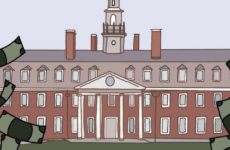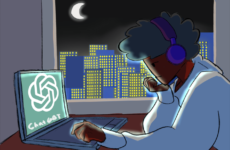As Rosalind Weisman and “A Culture of Dignity” continues to assess the culture of Choate, the number of campus conversations regarding healthy relationships – between both faculty and students – has reached a peak. Reactions to Weisman’s presentation at school meeting have ranged from pride at the School’s efforts to frustration at the frequency of these required conversations and their disruptions to some people’s lunch patterns. Regardless of this disparity, few have been exempt from the stir caused by the presentation. Now, the School must demonstrate its ability to translate data and observations into tangible administrative reforms. If this crucial step is overlooked, as some fear, many of the problems highlighted by this period of reflection will find no resolution.
Those engaged in initiatives to create a healthier campus dynamic, of whom I am one, are suspicious of the way that Weisman’s data has been interpreted and how it will lead to concrete change. At the heart of this suspicion are the two presentations on the results of the school-wide survey. In these, presenters have highlighted, first, the disparity between the perceived and real prevalence of hook-up culture and, second, an observation that healthy motivations for campus relationships outnumber unhealthy ones.
First, presenters have used the results to assure students that they shouldn’t feel “left out” or “uncool” because they don’t engage in hookup culture. However, this assurance should not diminish the importance of having conversations about hookup culture. As we know from widespread media coverage and emphasis, hookup culture pervades the colleges and universities to which many Choate students will matriculate. Therefore, we should consider measures to engender healthy relationships to be preemptive. We must destigmatize and normalize talking about relationships that are both sexual and nonsexual in nature, even if seems like hookups are not as prevalent on campus as we once perceived them to be.
Within their data, presenters have also emphasized the great number of students who hook up for the right reasons. Rather than be satisfied with this statistic, however, we should pay more attention to those students who hook up for dangerous or unhealthy reasons. Assuming the trustworthiness of the survey results, enough students reported these motivations for their responses to not be an anomaly. That anyone engages in sexual activity because of social status or because of a perceived obligation is unacceptable. These students’ experiences should prompt further administrative efforts to teach students to identify power dynamics and how to deal with them. Those that tend to wield power in certain relationships would benefit from guidance and education, like the student-facilitated workshops on consent, that will teach them how to foster a safer and more compassionate community.
This will take more than updating the Sophomore Seminar curriculum. Administrators should also take note of student initiatives from groups such as Students Advocating Gender Equality (SAGE), whose five-page proposal for the Weisman meetings contained all the reforms I have mentioned and numerous others, and the Committee on Respectful Relationships, whose members have been developing solutions for these issues since last spring. Since both of these groups are student-run, they can provide an intimate understanding of Choate culture that no survey result can hope to replace. These student-led initiatives should have primacy in the discussion around reforms and deserve the support of the administration in all their endeavors.
To its credit, the School has amassed an impressive amount of data regarding the experiences of its students. However, many are anxious to observe how this information will translate into concrete change. The School should resist adopting tunnel vision and focusing on only positive statistics. Many student voices have raised concerns over the many changes that have yet to be made. These voices must be met not only by ears willing to listen but also by people intending to affect change. Only by working together can the Administration and Choate students seek to reap the fruits of their recent labor.




